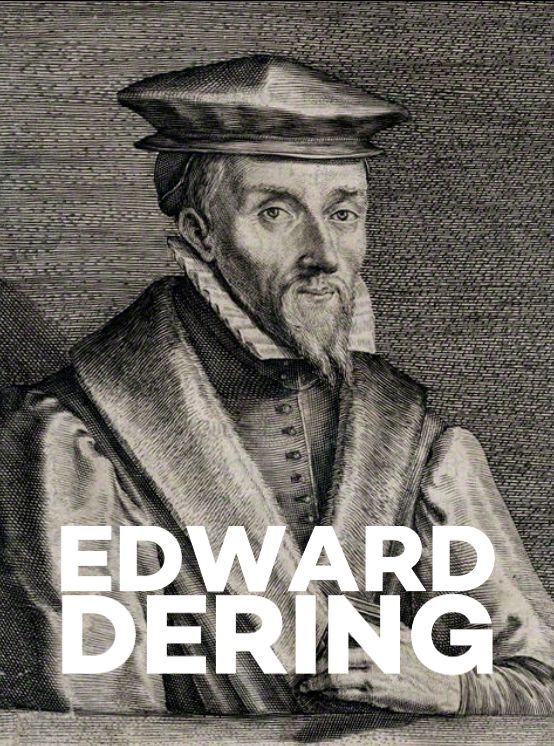Edward Dering (1540-1576) was a preacher without compromise, and in 1570 he was invited to speak before Queen Elizabeth I and her royal subjects. Dering did not hold back any punches. Here is part of his message:
“Look upon your ministry (clergy), and there are some of one occupation, some of another: some shake bucklers, some ruffians, some hawkers and hunters, some dicers and carders, some blind guides and can not see, some dumb dogs and will not bark. And yet a thousand more inequities have not covered the priesthood. And yet you in the meanwhile that all these whoredoms are committed, you at whose hands God will require it, you sit still and are careless, let men do as they list. It touches not your commonwealth, and therefore you are so well contented to let all alone … The Lord increase the gifts of his Holy Spirit to you, that from faith to faith, you may grow continually, till that you be zealous as good King David, to work his will.”
Whatever Queen Elizabeth I might have expected by inviting Dering to preach a sermon in her presence, it was certainly not one of direct rebuke. Dering’s primary intent was to remind the Queen of her duty (which she was not doing) to continue to promote the preaching of the Gospel since she was the head of the church. He used many biblical examples of monarchs who used their influence to uphold the Gospel and that God would judge her for her actions or idleness. Dering wanted to focus on Scripture and have a clear conscience by not capitulating, even to the most powerful person in the land, and challenging her to remove corrupt ministers.
Typically, when someone had the opportunity to preach in front of royalty, this would be seen as a high point in one’s career. However, Dering was not interested in fame or a career in the Church of England if it meant compromising. He had seen enough corruption in a clergy solely interested in money and fame. He wrote a letter to a chancellor, “while they [bishops and clergy] are clothed in scarlet, their flocks perish for cold, and while they fare deliciously, their people are faint with a most miserable hunger. This fault is intolerable, and such as God abhorreth.” He wanted reform in the church and the nation of England because people were “starving sheep” who were “without a shepherd.”
To help understand the setting Elizabeth I was both the head of state and church, and after taking the throne from her sister Mary, she tried to find more of a middle ground between Protestantism and Catholicism. While there was a separation from Rome, the Church of England did not look much different. Elizabeth kept the same hierarchical structure, traditional liturgical forms of worship, religious garb, choral music, the use of church bells, making church mandatory (those who did not attend faced fines or jail time), and the use of the Book of Common Prayer.
Dering’s style, influence, and courage were early models that set the patterns for future Puritan ministers. He received his education at Christ’s College, Cambridge (known as the “seed-bed of Puritan religion”), received his B.A. in 1560, and commenced his M.A. in 1563. While studying, he was recognized as “the greatest learned man in England.” In 1566 he was a university proctor and professor at Cambridge, he was a chaplain to the Duke of Norfolk, and he held a chaplaincy in the Tower of London.
Dering was a controversial figure in his day (and would be today) because he wrote on the importance of preaching the Gospel as an essential mark of the church and neglecting this would be a disgrace to the preacher. Much of his letters to clergy and bishops addressed this issue. Dering called out many preachers for their worldly philosophy and used smooth talk to win people for personal gain. His emphasis on biblical preaching (influencing later Puritans) was the central task of the minister, and he described the worst thing to happen to England would be the presence of weak, ignorant, non-preaching clergy.
In 1573, the consequences of his sermons and writings resulted in his suspension as a lecturer and preacher. He was summoned before the Star chamber and charged with having “utterance to unwarrantable and unorthodox sentiments.” Dering was forbidden to preach again in Queen Elizabeth’s kingdom, and she never retracted her orders. He accepted the consequences and did not preach. However, his sermons were printed and shared among the people. In fact, “his sermon before the queen became the most reprinted Elizabethan sermon ever, with sixteen editions published just within the queen’s life.”
In 1572, Dering married Anne Locke (1533-1590). She was a widow and a few years his senior. Locke was friends with John Knox (1513-1572), and the similarities between Dering and Knox were present in their fiery preaching and heart for the lost. In 1575 Dering could sympathize with those who were ill and faced physical afflictions as he suffered from tuberculosis. 1576, at the age of 36, he succumbed to his illness and died surrounded by loved ones and friends.
What we learn from Edward Dering is that he was a man who was willing to preach the Gospel and call out sin, even to the most influential people in England. He counted the cost and was not going to compromise as many preachers did in his day. Edward Dering paved the way for future uncompromising Puritans such as William Perkins and William Ames, who also came out of Cambridge. These men and many others were influenced by his courage and his stand for the Gospel

